Videographer Pono Kealoha uploaded this video of OHA CEO Dr. Kamana‘opono Crabbe’s press conference on the morning of May 12, 2014 at the headquarters of the Office of Hawaiian Affairs.

Videographer Pono Kealoha uploaded this video of OHA CEO Dr. Kamana‘opono Crabbe’s press conference on the morning of May 12, 2014 at the headquarters of the Office of Hawaiian Affairs.
Hawaii News Now reports “Hawaiian Affairs CEO moving forward after letter”
HONOLULU (HawaiiNewsNow) – Does the Hawaiian Kingdom still exist? That’s the question the CEO of the Office of Hawaiian Affairs wants answered by the U.S. Justice Department.
His inquiry has sparked an internal dispute within OHA, as several trustees have attempted to rescind the request, but he’s standing by his decision and now a few trustees are switching sides and backing him as well.
Dr. Kamanaʻopono Crabbe addressed the public today for the first time since submitting a formal request to Secretary of State John Kerry seeking clarification on the legal status of the Kingdom of Hawaiʻi.
Flanked by dozens of supporters, Dr. Crabbe held a press conference Monday morning to clarify the intent of his inquiry, which he says was sent within his authority under OHA’s governing documents and Hawai’i statutory law.
He says the chief reason for requesting that Secretary Kerry seek a legal opinion of the U.S. Attorney General regarding the status of Hawai’i under international law is to ensure OHA can effectively facilitate a process of rebuilding a Hawaiian nation. Dr. Crabbe went on to say highly qualified experts have provided their answers to the questions posed, but it would be irresponsible for OHA to assume the United States views the situation similarly.
“My staff and I have held some 30 community meetings in the past two months regarding our proposed process to rebuild our nation. In that same period we also held two governance summits with key community leaders. At these gatherings, and in other virtual contexts, we heard repeatedly concerns about engaging in a process of rebuilding a nation when — following the research of many legal, historical, and political experts — our nation continues to exist in the context of international law,” Dr. Crabbe said.
Dr. Crabbe says he made the inquiry because these claims appear to be valid, but for over 120 years, Native Hawaiians voices and concerns have not been properly answered.
“It is imperative for us to move forward to have at least accurate information and truth so that our people can make well informed decisions,” Dr. Crabbe said.
Among the questions Dr. Crabbe asked in his letter to Secretary Kerry:
“First, does the Kingdom of Hawaiʻi, as a sovereign independent State, continue to exist as a subject of international law?
Second, if the Hawaiian Kingdom continues to exist, do the sole-executive agreements bind the United States today?”
Experts say these are questions that have come up for decades, since the illegal overthrow of the Kingdom of Hawaiʻi in 1893 and since the U.S. government formally apologized for the illegal overthrow in 1993, but supporters say this is the first time the State Department has ever been asked point blank for an answer.
OHA’s CEO says his inquiry is not intended to invalidate the nation-building efforts of Kanaʻiolowalu but to make sure self-determination is achieved legally and with no unanswered questions.
“I can only imagine the burden that our Queen Lili’uokalani faced in 1893, but her charge and her legacy, and most of all, her spirit remains with us today, but most of all we must heed not only her guidance but each other,” Dr. Crabbe said. “For we are all Natives. We are patriots. We are sons and daughters of this great land and as we move forward let not the differences divide us, but let our common beliefs and values and the principals of our kupuna unite us. That is the call I ask from our people, from our trustees and our staff as we move forward in unity,” said Dr. Crabbe.
Only one trustee was present at Monday morning’s press conference, Oswald Stender. Dr. Crabbe addressed the disagreement that exists between himself and OHA’s trustees since they learned of his inquiry, but says he has not been asked to resign or step down from his position as CEO.
“I continue to believe my decision to send the letter was in the best interest of OHA and the beneficiaries we serve,” said Dr. Crabbe. “The Hawaiian community needed to know that I was inquiring about the very matters they sought to bring forward. And this is the reason I felt it was imperative to not only ask the questions but that the community be aware of the inquiry.”
Initially, all nine trustees signed a letter asking Secretary Kerry to rescind Dr. Crabbe’s inquiry, which was sent by OHA Chair Colette Machado Friday afternoon.
However, over the weekend Trustee Dan Ahuna sent another letter to Secretary Kerry — this time, asserting his support for Dr. Crabbe’s initial inquiry.
“It clearly appears that Dr. Crabbe is carrying out his fiduciary authority of due diligence in gathering evidence needed to make decisions as the Chief Executive Officer of the Office of Hawaiian Affairs,” Ahuna wrote. “It is the best interest of our people to gather further information and pertinent documents.”
Immediately following Dr. Crabbe’s press conference Monday morning, Trustee Carmen Hulu Lindsey sent a letter to Chair Machado asking her name be removed from the rescind request.
“I have attended the many community town hall meetings OHA has held throughout the islands and heard the concerns articulated in Dr. Crabbe’s letters expressed by several people. While those questions may be troubling and difficult to address, it is precisely because they are so that I now believe Dr. Crabbe demonstrated courage and integrity in moving those concerns forward to try to get the clarity we need,” Lindsey wrote.
More than 1,200 people have signed He Mana’o Pono, a petition in support of Dr. Crabbe’s State Department request since Saturday.
“Really what we’ve sought in that letter of support is first to honor Dr. Kamana’opono Crabbe and the position that he’s taken and really bringing to the forefront questions that have plagued our community for generations. We’re not committed to any particular answers to those questions or outcome , but we are committed to having those questions asked,” said said Dr. Kamanamaikalani Beamer, a law professor with the University of Hawaiʻi at Manoa. “Hawaiʻi is at a pivotal time. We need facilitative leadership. We need people that are going to bring our communities together and I feel like answers to these questions and clarifications will help and I want to support a leader that listens to our people.”
“Those are important questions — some of which are coming out of the University right now. This is cutting edge research on the legal political history of Hawaiʻi that I think is prompting a new kind of awareness in the community. What you’ve seen the CEO do today is respond to that new awareness — this new curriculum, this new education and research that’s coming out of the university,” said Dr. Willy Kauai, a UH Manoa lecturer in the Ethnic Studies department. “I think what’s paramount in what took place today was kind of a call for education that, ʻEh, if we’re going to go about doing these important things, such as nation-building, we should probably have a very clear understanding of our own history’.”
Hundreds have commented on the petition.
“The truth can only be hidden from the world for so long. People in positions of power and policy making who have a conscience must speak out to the truth and challenge those who continue to perpetuate the lie that Hawaiʻi is a state of the USA. Kamanaʻopono Crabbe is another champion in our history of leaders to step forth and question what is perceived to be the truth. Mahalo nunui e Kamanaʻopono and to all who continue to keep the fire alive!” one supporter wrote.
“As a person of non-Hawaiian ancestry, I stand in solidarity with the statement of support by He Mana’o Pono. It has been over 100 years of illegal occupation by the US goverment of these sovereign islands and it is high time the US government obliged to its obligations under international law as an occupying power, to uphold the Hawaiian constitution until such time as to the end of said occupation,” wrote another who signed the petition.
In a statement from OHA Chair Colette Machado sent to Hawaii News Now and all of the OHA staff, Machado writes she agrees Dr. Crabbe “has identified important questions that have been asked by many advocates for Hawaiʻi’s independence throughout the decades since the illegal overthrow of our Queen”, but says his actions “by-passed our Hawaiian legislators who have worked diligently, against great odds, to protect our Native Hawaiian trusts, programs, lands and entitlements. They also sponsored and promoted Act 195 for the Kanaʻiolowalu roll.”
“I believe that the action pursued by Ka Pouhana demonstrates a lack of respect for the over 125,000 Native Hawaiians who registered to participate in the process,” Machado wrote.
According to Machado, an executive session will be held to address the trustees concerns with Dr. Crabbe next week at which time they will “initiate an investigation of the breach of established processes” and decide on a strategy to have the questions Dr. Crabbe raised addressed “without affecting the Kanaiʻiolowalu process and OHA’s commitment to facilitating a process to reorganize a Native Hawaiian Governing Entity.” Machado says the trustees will take “appropriate action” following their meeting.
Statement of Chair Colette Machado – http://bit.ly/1onwhim
Chair Machado’s Message to all OHA – http://bit.ly/1onwkdW
Here is a copy of Dr. Crabbe’s address from Monday morning’s press conference in its entirety:
Prepared Comments of Dr. Kamana’opono Crabbe
Office of Hawaiian Affairs Ka Pouhana and CEO Press Conference of May 12, 2014
Aloha mai kakou,
I called this media conference today to offer additional information about my letter to U.S. Secretary of State John Kerry, which was sent within my authority under OHA’s governing documents and Hawai’i statutory law. As with any leader, I am often called upon to make tough decisions, which are sometimes controversial. I continue to believe my decision to send the letter was in the best interest of OHA and the beneficiaries we serve. I stand behind this decision and accept full responsibility for it.
As Ka Pouhana and CEO of the Office of Hawaiian Affairs, I must ensure that the policies and commitments of the OHA Board of Trustees are implemented with thorough due diligence and a minimization of risk to the Office of Hawaiian Affairs. I take this responsibility seriously. And that was the chief reason for my inquiry with Secretary Kerry.
As stated in the media release sent out this past Friday, I requested that U.S. Secretary of State John Kerry seek a legal opinion of the U.S. Attorney General regarding the status of Hawai’i under international law. I also posed additional questions to clarify how the answer to that primary question impacts current efforts to rebuild a Hawaiian nation.
Answers from the U.S. Attorney General are needed for OHA to effectively facilitate a process of rebuilding a Hawaiian nation. We must start with agreed upon facts (or begin identifying points of disagreement that require clarification). Highly qualified experts have provided their answers to the questions posed. However, it would be irresponsible for OHA to assume that the United States views the situation similarly. The stakes are far too high for OHA to proceed under assumptions.
A second reason for my questions to Secretary Kerry stems from our Hawaiian community. My staff and I have held some 30 community meetings in the past two months regarding our proposed process to rebuild our nation. In that same period we also held two governance summits with key community leaders. At these gatherings, and in other virtual contexts, we heard repeatedly concerns about engaging in a process of rebuilding a nation when-following the research of many legal, historical, and political experts-our nation continues to exist in the context of international law. Such concerns have led our community to request more time in the nation rebuilding process to have questions– such as I raised with Secretary Kerry– fully explored and shared with our people so that they can make well-informed decisions throughout the process.
The Hawaiian community needed to know that I was inquiring about the very matters they sought to bring forward. And this is the reason I felt it was imperative not only that I ask the questions but that the community be aware of the inquiry.
However, recognizing the gravity of the questions posed, I met with Chair Machado before making the letter public. I explained that my questions were a matter of due diligence and risk management to avoid OHA missteps in its nation rebuilding facilitation. I believed I had her consent to proceed with sharing publicly my letter to Secretary Kerry. Unfortunately, it is now apparent that we walked away from that meeting with a misunderstanding and misinformation.
Despite disagreements that will need to be worked out between myself and OHA’s trustees, I am certain that the Board and I stand firmly together in our commitment to do all that we appropriately can to reestablish a Hawaiian nation. I look forward to engaging with the trustees in the ho’oponopono, which Chair Machado graciously suggested, so that we can work collectively to Ho’oulu Uihui Aloha, to Rebuild a Beloved Nation.
We must succeed in our efforts for the good of our lahui, our community, and our families for generations to come.
HONOLULU (AP) – The chief executive of the Office of Hawaiian Affairs said Monday he’s moving forward after a disagreement with the organization’s trustees over seeking clarification on the legal status of the Hawaiian Kingdom.
But CEO Kamanaopono Crabbe told reporters Monday he stands behind a letter he sent to U.S. Secretary of State John Kerry last week that sought a legal opinion on whether the kingdom continues to exist under international law.
“I continue to believe my decision to send the letter was in the best interest of OHA and the beneficiaries we serve,” Crabbe said.
The request revealed divisions within the state agency that has a mission of protecting Native Hawaiians and perpetuating Hawaiian culture.
After Crabbe revealed the letter on Friday, all nine trustees signed a different note to Kerry saying Crabbe’s letter didn’t reflect their position or that of the agency. On Monday, one trustee, Dan Ahuna, mailed yet another letter to Kerry reversing his position, removing his signature from the trustees’ letter and giving his support to Crabbe.
Crabbe, speaking at a news conference with nearly 100 supporters at the agency’s headquarters in Honolulu, said he thought he had the blessing of the board’s chairwoman, Colette Machade, before sharing the letter with the public. He said he believes answers to the questions in the letter are crucial for moving forward withpursuing a Native Hawaiian governing entity.
Machado, who was in meetings on Molokai on Monday, did not immediately return a message seeking comment from the Associated Press.
Crabbe said the board took a position, and it’s his role to implement that decision. “We are currently moving forward,” he said.
Crabbe said he had had several discussions with a majority of the board’s nine trustees and looked forward to meeting with them again next week. “They have not asked me to resign,” he said.
In his original letter, Crabbe wrote that he was concerned with an analysis by scholars alleging the federal and state governments were illegal regimes. The scholars said Office of Hawaiian Affairs trustees and Native Hawaiian Roll Commission members may be criminally liable under international law.
Crabbe said he would ask trustees to put off pursuing a Native Hawaiian governing entity until they confirmed the kingdom doesn’t exist under international law.
Crabbe said supporters of building a governing entity should continue their discussions.
“Remain vigilant and to be aware and to participate regarding their choice,” he said. “That’s what this is all about.”
KITV News reported “OHA CEO explains disagreements with trustees: Crabbe stands behind letter to Kerry seeking legal opinion”
HONOLULU —The chief executive of the Office of Hawaiian Affairs explained to the media on Monday a disagreement with the organization’s trustees over seeking clarification on the legal status of the Hawaiian Kingdom.
CEO Kamana’opono Crabbe told reporters Monday he stands behind a letter he sent to U.S. Secretary of State John Kerry last week, seeking a legal opinion on whether the kingdom continues to exist under international law.
After revealing the letter, all nine trustees signed a different note to Kerry saying Crabbe’s letter doesn’t reflect their position or the agency’s.
“The Hawaiian community needed to know that I was inquiring about the very matters they sought to bring forward,” said Crabbe. ‘And this is the reason I felt it was imperative not only that I ask the questions but that the community be aware of the inquiry.”
Crabbe says he thought he had the blessing of the board’s chairwoman before sharing the letter publicly. He says he believes answers to the questions in the letter are crucial for moving forward with pursuing a Native Hawaiian governing entity.
“Despite disagreements that will need to be worked out between myself and OHA’s trustees, I am certain that the Board and I stand firmly together in our commitment to do all that we appropriately can to reestablish a Hawaiian nation,” said Crabbe.
Here follows the letter Office of Hawaiian Affairs CEO Kamana‘opono Crabbe submitted to the Department of State dated May 5, 2014. What will be gleaned from the letter itself is that the CEO was well within his vested power to seek clarity on the question of the continued existence of the Hawaiian Kingdom.
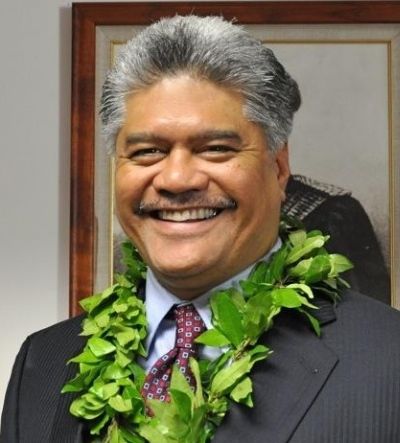 After the Office of Hawaiian Affairs CEO Dr. Kamana‘opono Crabbe submitted a formal request to Secretary of State John Kerry seeking clarification on the legal status of Hawai‘i under international law, all nine OHA Trustees yesterday signed a letter to the Secretary of State, stating:
After the Office of Hawaiian Affairs CEO Dr. Kamana‘opono Crabbe submitted a formal request to Secretary of State John Kerry seeking clarification on the legal status of Hawai‘i under international law, all nine OHA Trustees yesterday signed a letter to the Secretary of State, stating:
“We understand that you received a letter from Office of Hawaiian Affairs Chief Executive Officer Kamana‘opono M. Crabbe, PhD dated May 5, 2014. The contents of that letter do not reflect the position of the Board of Trustees of the Office of Hawaiian Affairs or the position of the Office of Hawaiian Affairs. That letter is hereby rescinded.”
Did the Trustees even read Dr. Crabbe’s letter? How do you rescind a letter that seeks clarification for risk management purposes. You can’t. The only person that can rescind the letter is the CEO himself, and only when the risks identified have been found to not be risks in the first place. Another word for this is fiduciary duty.
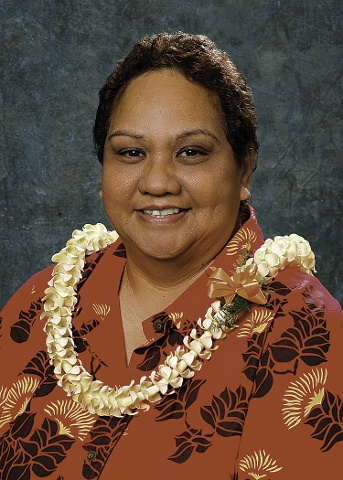 This morning’s front page article in the Star-Advertiser reported that Trustee Chairwoman Colette Machado said “Crabbe exceeded his authority as chief executive officer that requires him to consult the board on such matters.” Is Dr. Crabbe’s request for clarification a management issue or a board issue. Does the CEO need Board approval to ask questions? What is the position of the Board of Trustees of the Office of Hawaiian Affairs? We don’t want clarification? The so-called rescind letter is not only odd, but it is disingenuous and has nothing to do with Dr. Crabbe’s letter. It also raises the question of who is pulling the strings.
This morning’s front page article in the Star-Advertiser reported that Trustee Chairwoman Colette Machado said “Crabbe exceeded his authority as chief executive officer that requires him to consult the board on such matters.” Is Dr. Crabbe’s request for clarification a management issue or a board issue. Does the CEO need Board approval to ask questions? What is the position of the Board of Trustees of the Office of Hawaiian Affairs? We don’t want clarification? The so-called rescind letter is not only odd, but it is disingenuous and has nothing to do with Dr. Crabbe’s letter. It also raises the question of who is pulling the strings.
After carefully reviewing Dr. Crabbe’s letter, he did not state or even imply that he was taking any position on whether or not the Hawaiian Kingdom continues to exist. He merely sought clarification on a legal issue that the Department of Justice’s Office of Legal Counsel is more than capable of answering. If there is any position taken by Dr. Crabbe its responsible management and the well-recognized principle “risk management.” His letter begins with:
“As the chief executive officer and administrator for the Office of Hawaiian Affairs, being a governmental agency of the State of Hawai‘i, the law places on me, as a fiduciary, strict standards of diligence, responsibility and honesty. My executive staff, as public officials, carry out the policies and directives of the Trustees of the Office of Hawaiian Affairs in the service of the Native Hawaiian community. We are responsible to take care, through all lawful means, that we apply the best skills and diligence in the servicing of this community. It is in this capacity and in the interest of the Office of Hawaiian Affairs I am submitting this communication and formal request.”
The performance of risk assessment begins with identification of risks. Once the risk or risks have been determined the management can choose to avoid the risk, reduce the risk, share the risk or retain the risk. After the option is made, management then calls for a plan for contingencies, create safeguards, and, lastly, to monitor.
Dr. Crabbe has clearly taken the path to avoid the risk by seeking clarification from the State Department and the Department of Justice’s Office of Legal Counsel.
From his letter he specifically states the risks began to surface when one of his executive managers attended a presentation and panel discussion at the University of Hawai‘i Law School featuring former Hawai‘i governor John Waihe‘e, III, senior Law Professor Williamson Chang and political scientist Dr. Keanu Sai. The law student chapter of the American Constitutional Society sponsored the presentation. Dr. Crabbe provided Secretary of State Kerry an online link to view the video of the law school presentation.
https://vimeo.com/92655472
Crabbe wrote, “The presentations of Professor Chang and Dr. Sai provided a legal analysis of the current status of Hawai‘i that appeared to undermine the legal basis of the Roll Commission, and, as alleged in the panel discussions, the possibility of criminal liability under international law. Both Professor Chang and Dr. Sai specifically stated that the Federal and State of Hawai‘i governments are illegal regimes that stem from an illegal and prolonged occupation by the United States as a result of the illegal overthrow of the Hawaiian Kingdom government. As a government agency of the State of Hawai‘i this would include the Office of Hawaiian Affairs, and by enactment of the State of Hawai‘i Legislature, it would also include the Roll Commission. Both Act 195 and U.S. Public Law 103-150, acknowledges the illegality of the overthrow.”
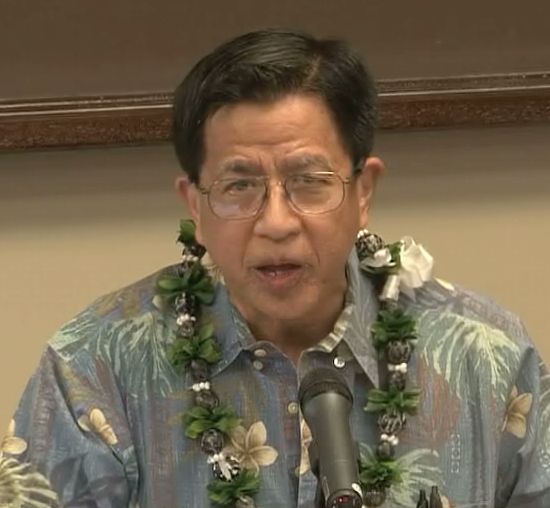 Here are some quotes from senior Law Professor Chang:
Here are some quotes from senior Law Professor Chang:
“The power of the United States, over the Hawaiian islands, and the jurisdiction of the United States in the State of Hawai’i, by its own admissions, by its own laws, doesn’t exist. And so that means that ever since the 1898 annexation of Hawai’i, by a Joint Resolution, they say, we have been living a myth.” (3:01 min/sec.)
“If you don’t have legal power over a territory, you’re governing without jurisdiction.” (4:20 min/sec.)
“…there’s no treaty between the United States and Hawai‘i by which Hawai‘i was acquired by the United States…” (4:41 min/sec.)
“A joint resolution, as an act of Congress, cannot acquire another country …If the United States could acquire Hawai‘i then the House of Nobles and the Legislative Assembly of Hawai‘i could acquire the United States.” (4:54 min/sec.)
“If two sovereigns are equal … one cannot acquire the other by its own laws.” (5:17 min/sec.)
“If Congress cannot, by Joint Resolution in 1898, acquire Hawai‘i unilaterally, it cannot do so in 1959.” (9:42 min/sec.)
“So in short, the United States by its own hands admits that it didn’t acquire the Hawaiian Islands, and all those Hawaiians, who have been saying the United States doesn’t have jurisdiction, have been right.” (11:25 min/sec.)
“So the annexation, that we all admit that nothing can be achieved without the United States going along with it, that’s the 900 lbs. elephant in the room. But we have to come in with the best leverage we have, and the best leverage we have is a hundred years of being lied to, being misrepresented, being told that we were part of the United States, and that has been legally false.” (17:19 min/sec.)
“…we’re all in this boat together in this journey of knowledge, and when I talk about the state of emergency, being the United States, how it is able to govern us for a hundred years without putting guns to our heads, it’s us. We’re the problem, the law school is the problem. Why, because judges and lawyers have a duty of candor and truth. Judges, on their own, have to tell the courts, tell the attorneys that there is no jurisdiction. It’s a duty of zealous representation for attorneys to present the best defense, and isn’t it the best defense that there’s no jurisdiction.” (1:36:41 hr/min/sec.)
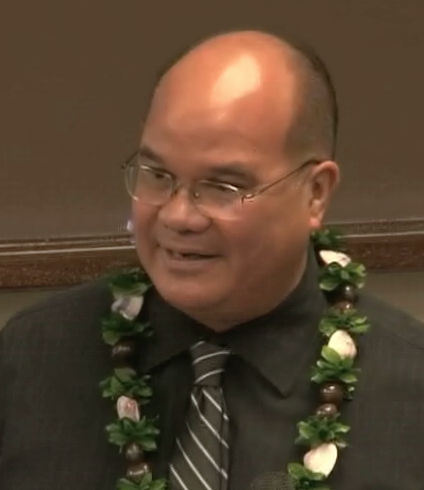 Here some quotes from political scientist Dr. Keanu Sai:
Here some quotes from political scientist Dr. Keanu Sai:
“Without a treaty, the United States has enacted “internal laws,” by its Congress, imposed in Hawai‘i…1898 Joint Resolution of Annexation, 1900 Territorial Act, 1959 Statehood Act, 1993 Joint Resolution of Apology for the 1893 Overthrow” (1:37:17 hr/min/sec.)
“Now the first and foremost restriction imposed by international law upon a State is that it may not exercise its power in any form in the territory of another State. In this sense jurisdiction is certainly territorial; it cannot be exercised by a State outside of its territory except by virtue of a permissive rule derived from international custom or from a convention.” (1:36:53 hr/min/sec.)
“military occupation confers upon the invading force the means of exercising control for the period of occupation. It does not transfer the sovereignty to the occupant, but simply the authority or power to exercise some of the rights of sovereignty.” (1:13:19 hr/min/sec.)
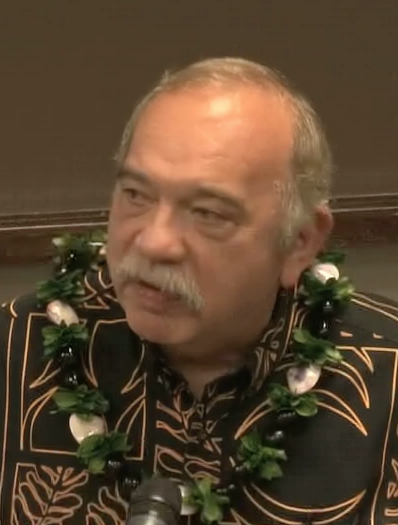 Even former governor and chairman of the Native Hawaiian Roll Commission Waihe‘e was in agreement with Dr. Sai’s analysis that Hawai‘i is not a part of the United States. Waihe‘e told the audience:
Even former governor and chairman of the Native Hawaiian Roll Commission Waihe‘e was in agreement with Dr. Sai’s analysis that Hawai‘i is not a part of the United States. Waihe‘e told the audience:
“I have absolutely no doubt that Hawai‘i is in an illegal occupation, I have absolutely no doubt. I mean, you’ve got to be illiterate not to finally get to that point.” (1:19:04 hr/min/sec.)
Can a CEO of the Office of Hawaiian Affairs take this lightly, especially when the Chairman of the Native Hawaiian Roll Commission himself stated he has no doubt that Hawai‘i is occupied and that you’ve got to be illiterate to not see it. Dr. Crabbe correctly states:
“These matters have raised grave concerns with regard to not only the Native Hawaiian community we serve, but also to the vicarious liability of myself, staff and Trustees of the Hawaiian Affairs, and members of the Native Hawaiian Roll Commission. The community we serve, the Trustees, and many of my staff members, to include myself, and the members of the Roll Commission are Native Hawaiians, who are direct descendants of Hawaiian subjects of the Hawaiian Kingdom. And as a State of Hawai‘i governmental agency, it would also appear that I am precluded from seeking any opinion on the veracity of these allegations from our in house counsel or from the State of Hawai‘i Attorney General, because there would appear to exist a conflict of interest if these allegations are true.”
Dr. Crabbe then provided the questions he’s seeking to be answered as part of the process of risk management.
• First, does the Hawaiian Kingdom, as a sovereign independent State, continue to exist as a subject of international law?
• Second, if the Hawaiian Kingdom continues to exist, do the sole-executive agreements bind the United States today?
• Third, if the Hawaiian Kingdom continues to exist and the sole-executive agreements are binding on the United States, what effect would such a conclusion have on United States domestic legislation, such as the Hawai‘i Statehood Act, 73 Stat. 4, and Act 195?
• Fourth, if the Hawaiian Kingdom continues to exist and the sole-executive agreements are binding on the United States, have the members of the Native Hawaiian Roll Commission, Trustees and staff of the Office of Hawaiian Affairs incurred criminal liability under international law?”
Dr. Crabbe’s conclusion in his letter clearly speaks to risk management and his determination to avoid the risk of criminal liability under international law. He stated, “While I await the opinion from the Office of Legal Counsel, I will be requesting approval from the Trustees of the Office of Hawaiian Affairs that we refrain from pursuing a Native Hawaiian governing entity until we can confirm that the Hawaiian Kingdom, as an independent sovereign State, does not continue to exist under international law and that we, as individuals, have not incurred any criminal liability in this pursuit.”
At no point has Dr. Crabbe taken a position for the Office of Hawaiian Affairs and nor has he taken a position of whether the Hawaiian Kingdom continues to exist. He’s seeking clarification from a federal agency who is more than capable of providing the answers. As chief executive officer, Dr. Crabbe is responsible for the protection of the staff at the Office of Hawaiian Affairs, which includes the Trustees, and to the Native Hawaiian community OHA serves. The Trustees’ so-called rescind letter is a blatant attempt to undermine the very duty Dr. Crabbe was appointed to do as the CEO of the Office of Hawaiian Affairs. The Trustees’ do not manage the Office of Hawaiian Affairs, the CEO does.
The irony is that Dr. Crabbe’s request for clarification is to protect the Trustees, even from themselves.
HONOLULU (HawaiiNewsNow) – Does the Kingdom of Hawai’i exist today — and are we all subject to its rules? Those questions have triggered an internal dispute within the Office of Hawaiian Affairs.
OHA’s Chief Executive Officer created a firestorm Friday when word spread he sent a letter to the Secretary of State asking for an official opinion on whether the Hawaiian Kingdom still exists as an independent sovereign state under international law. Problem is, it appears no one else at OHA knew about or agreed with the letter, stirring an internal controversy that has raised concerns the inquiry could derail or delay Kana’iolowalu nation-building efforts.
Officials confirm the letter was quietly sent out on Monday by OHA CEO Dr. Kamana’opono Crabbe, in which he requested a formal legal opinion from the Justice Department.
“I will be requesting approval from the Trustees of the Office of Hawaiian Affairs that we refrain from pursuing a Native Hawaiian governing entity until we can confirm that the Hawaiian Kingdom as an independent sovereign State, does not continue to exist under international law and that we, as individuals, have no incurred any criminal liability in this pursuit,” Crabbe wrote.
OHA Chair Colette Machado tells Hawaii News Now she and fellow trustees only learned of the letter Friday afternoon.
“Our whole goal is to establish a Native Hawaiian governing entity and we are very close in achieving that. The Trustees fully support this, that’s why we’re quite surprised — how did our Chief Executive Officer not understand this by sending the letter to the state Department especially to the Secretary John Kerry? That’s why we had to respond quickly on a unanimous position to rescind that letter, because it is not an official position of OHA,” Machado said by phone from Washington, D.C., where she and Crabbe are attending a meeting about the upcoming World Conference on Indigenous Peoples at the invitation of the Department of State.
All nine trustees signed off on retracting the letter, which Machado confirms has already been sent to the Department of Justice.
“I want to assure the Hawaiian people that the Board of Trustees has not changed its position towards facilitating a process to reorganize a Native Hawaiian governing entity,” Machado said.
Native Hawaiian Roll Commission Chair, former Governor John Waihe’e, says he was also surprised by the letter.
“For all of us that know our history, there’s no doubt in our mind that the government of Queen Lili’uokalani was illegally overthrown and that the United States annexation of Hawaii was not done properly, was not done legally. In fact, this was admitted by the United States Congress when they passed the resolution — the apology resolution — in 1993. Any of us that know our history, know that we don’t need to ask anybody, know whether or not any of these things were proper — what we need to do is go about organizing ourselves and beginning to assert our own self governance. I don’t know what motivated Kamana’opono to do this, but personally I think it’s sort of disempowering. It’s a disempowering tactic to ask for permission to pursue your own destiny,” Waihe’e said.
More than 125,000 people have signed up for Kana’iolowalu to pursue a Native Hawaiian self-governing entity, an effort which OHA is financing.
“That’s more people than all the labor unions in Hawai’i combined,” said Waihe’e. “As far as we’re concerned, the Roll Commission is concerned, we’re still proceeding forward.”
Hawaii News Now was unable to reach Dr. Crabbe directly Friday. Officials confirm he scheduled a press conference for next week Monday to explain the inquiry, but now that the trustees have rescinded that letter it’s unclear if the press conference will still be happening.
To view Dr. Crabbe’s request letter, click here.
HONOLULU (AP) – Office of Hawaiian Affairs CEO Kamanaopono Crabbe says he will seek approval from the agency’s trustees to refrain from pursuing a Native Hawaiian governing entity.
Crabbe says the agency would put nation building efforts on hold until officials are able to confirm the Hawaiian Kingdom doesn’t continue to exist under international law.
Crabbe outlined his proposal in a May 5 letter to Secretary of State John Kerry. The agency released a copy of the letter Friday.
The letter says an analysis from scholars alleging federal and state governments are illegal regimes has raised concerns. The analysis says OHA trustees and Native Hawaiian Roll Commission members may be criminally liable under international law.
Crabbe is asking the State Department to request an opinion from the Justice Department’s Office of Legal Counsel.
HONOLULU — Office of Hawaiian Affairs CEO Kamanaopono Crabbe says he will seek approval from the agency’s trustees to refrain from pursuing a Native Hawaiian governing entity.
Crabbe says the agency would put nation building efforts on hold until officials are able to confirm the Hawaiian Kingdom doesn’t continue to exist under international law.
Crabbe outlined his proposal in a May 5 letter to Secretary of State John Kerry. The agency released a copy of the letter Friday.
The letter says an analysis from scholars alleging federal and state governments are illegal regimes has raised concerns. The analysis says OHA trustees and Native Hawaiian Roll Commission members may be criminally liable under international law.
Crabbe is asking the State Department to request an opinion from the Justice Department’s Office of Legal Counsel.
FOR IMMEDIATE RELEASE
MAY 09, 2014
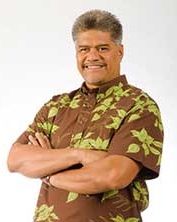 WASHINGTON, D.C. (May 9, 2014) – The Office of Hawaiian Affairs top executive submitted a formal request with the U.S. Department of State requesting a legal opinion from the U.S. Attorney General’s Office of Legal Counsel addressing the legal status of the Hawai‘i under international law.
WASHINGTON, D.C. (May 9, 2014) – The Office of Hawaiian Affairs top executive submitted a formal request with the U.S. Department of State requesting a legal opinion from the U.S. Attorney General’s Office of Legal Counsel addressing the legal status of the Hawai‘i under international law.
The Office of Legal Counsel drafts legal opinions of the U.S. Attorney General and also provides its own written opinions and oral advice in response to requests from the various agencies of the Executive Branch, which includes the Department of State.
Trustees and staff of the Office of Hawaiian Affairs are in Washington, D.C., at the invitation of the Department of State for a consultation with representatives of the federal government, federally recognized tribes and other indigenous peoples of the United States on May 9. The topic of the meeting is the World Conference on Indigenous Peoples, to be held at the United Nations, September 22-23, 2014. The meeting will take place at the U.S. Department of State, 23rd Street entrance, between C and D Streets, N.W., Washington, D.C.
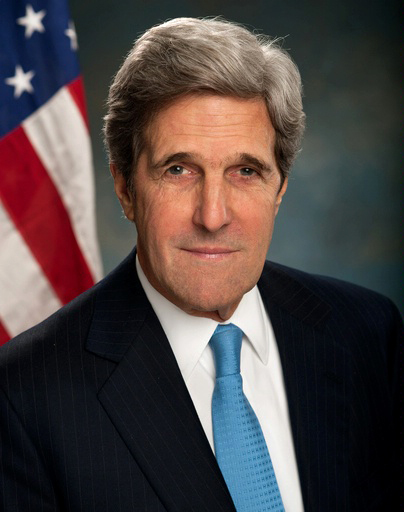 In a letter addressed to Secretary of State John F. Kerry, OHA Chief Executive Officer Dr. Kamana‘opono Crabbe, described his request as a very important question that needs to be answered from an agency that is not only qualified but authorized to answer, saying that it is addressing very grave concerns of OHA’s activities in its efforts toward nation building.
In a letter addressed to Secretary of State John F. Kerry, OHA Chief Executive Officer Dr. Kamana‘opono Crabbe, described his request as a very important question that needs to be answered from an agency that is not only qualified but authorized to answer, saying that it is addressing very grave concerns of OHA’s activities in its efforts toward nation building.
“As the chief executive officer and administrator for the Office of Hawaiian Affairs, being a governmental agency of the State of Hawai‘i, the law places on me, as a fiduciary, strict standards of diligence, responsibility and honesty,” Crabbe said. “My executive staff, as public officials, carry out the policies and directives of the Trustees of the Office of Hawaiian Affairs in the service of the Native Hawaiian community. We are responsible to take care, through all lawful means, that we apply the best skills and diligence in the servicing of this community.”
Crabbe explained the action taken was prompted when one of his staff attended a presentation and panel discussion at the William S. Richardson School of Law on April 17, 2014 that featured former Hawai‘i Governor John Waihe‘e, III, Chairman of the Native Hawaiian Roll Commission, senior Law Professor Williamson Chang, and Dr. Keanu Sai, a political scientist. Click here to view a video of the Law School presentation and panel discussion.
“The presentations of Professor Chang and Dr. Sai provided a legal analysis of the current status of Hawai‘i that appeared to undermine the legal basis of the Roll Commission, and, as alleged in the panel discussions, the possibility of criminal liability under international law. Both Professor Chang and Dr. Sai specifically stated that the Federal and State of Hawai‘i governments are illegal regimes that stem from an illegal and prolonged occupation by the United States as a result of the illegal overthrow of the Hawaiian Kingdom government.” Crabbe said. “As a government agency of the State of Hawai‘i this would include the Office of Hawaiian Affairs, and by enactment of the State of Hawai‘i Legislature, it would also include the Roll Commission. Both Act 195 and U.S. Public Law 103-150, acknowledges the illegality of the overthrow.”
According to Crabbe, “These matters have raised grave concerns with regard to not only the Native Hawaiian community we serve, but also to the vicarious liability of myself, staff and Trustees of the Office of Hawaiian Affairs, and members of the Native Hawaiian Roll Commission. The community we serve, the Trustees, and many of my staff members, to include myself, and the members of the Roll Commission are Native Hawaiians, who are direct descendants of Hawaiian subjects of the Hawaiian Kingdom.”
Crabbe said he wanted to seek an opinion on the veracity of these allegations from its in house counsel or from the State of Hawai‘i Attorney General, but felt he was prevented because there would appear to be a conflict of interest if these allegations were true.
In his letter, Crabbe said, “because the Department of State is the United States’ executive department responsible for international relations and who also housed diplomatic papers and agreements with the Hawaiian Kingdom, I am respectfully submitting a formal request to have the Department of State request an opinion from the Office of Legal Counsel, Department of Justice, addressing the following questions:
• First, does the Hawaiian Kingdom, as a sovereign independent State, continue to exist as a subject of international law?
• Second, if the Hawaiian Kingdom continues to exist, do the sole-executive agreements bind the United States today?
• Third, if the Hawaiian Kingdom continues to exist and the sole-executive agreements are binding on the United States, what effect would such a conclusion have on United States domestic legislation, such as the Hawai‘i Statehood Act, 73 Stat. 4, and Act 195?
• Fourth, if the Hawaiian Kingdom continues to exist and the sole-executive agreements are binding on the United States, have the members of the Native Hawaiian Roll Commission, Trustees and staff of the Office of Hawaiian Affairs incurred criminal liability under international law?”
A press conference is scheduled for Monday, May 12, at 10:00 a.m. when OHA’s Chief Executive Officer Dr. Crabbe returns from Washington, D.C.
Click here to download the request letter.
IMPORTANT NOTE: Dr. Crabbe’s letter specifically states:
“For your consideration, I have enclosed Dr. Sai’s law journal article published in the Journal of Law and Social Challenges that compares federal recognition under the Akaka bill and the international laws of occupation. Act 195 is the State of Hawai‘i’s version of the Akaka bill. Dr. Sai argues that Native Hawaiians are not indigenous people of the United States, but rather nationals of an occupied State. In addition, I’m am also enclosing a brief authored by Dr. Sai and Professor Matthew Craven from the University of London, SOAS, Law School, titled “The Continuity of the Hawaiian State and the Legitimacy of the acting Government of the Hawaiian Kingdom;” a DVD packet with booklet of the Larsen v. Hawaiian Kingdom, Permanent Court of Arbitration, The Hague, Netherlands (1999-2001); a Complaint filed with the President of the United Nations Security Council in 2001 (without exhibits); a Protest and Demand filed with the President of the United Nations General Assembly in 2012 (without exhibits); a Referral submitted with the Prosecutor of the International Criminal Court at the Hague, Netherlands, in 2013, calling upon the Prosecutor for the investigation of war crimes alleged to have been committed in Hawai‘i (without exhibits); and a complaint for war crimes filed with the Philippine government under its universal jurisdiction alleging that one of our Trustees of the Office of Hawaiian Affairs, Ms. S. Haunani Apoliona, committed a war crime in her private capacity as a member of the Board of Directors for the Bank of Hawai‘i (without exhibits).”
“While I await the opinion from the Office of Legal Counsel, I will be requesting approval from the Trustees of the Office of Hawaiian Affairs that we refrain from pursuing a Native Hawaiian governing entity until we can confirm that the Hawaiian Kingdom, as an independent sovereign State, does not continue to exist under international law and that we, as individuals, have not incurred any criminal liability in this pursuit.”
# # #
Media Contact: Garett Kamemoto
Communications Manager
808-594-1982
garettk@oha.org
War crimes are actions taken by individuals, whether military or civilian, that violates international humanitarian law, which includes the 1907 Hague Conventions, 1949 Geneva Conventions and the Additional Protocols to the Geneva Conventions. War crimes include “grave breaches” of the 1949 Fourth Geneva Convention, which also applies to territory that is occupied even if the occupation takes place without resistance. Protected persons under International Humanitarian Law are all nationals who reside within an occupied State, except for the nationals of the Occupying Power. The International Criminal Court and States prosecute individuals for war crimes.
War Crimes: Destroying or seizing the [Occupied State’s] property unless such destruction or seizure be imperatively demanded by the necessities of war
In 2006, the United States Army disclosed to the public that depleted uranium (DU) was found on the firing ranges at Schofield Barracks on the Island of O‘ahu. It subsequently confirmed DU was also found at Pohakuloa Training Area on the Island of Hawai‘i and suspect that DU is also at Makua Military Reservation on the Island of O‘ahu. The ranges have yet to be cleared of DU and the ranges are still used for live fire. This brings the inhabitants who live down wind from these ranges into harms way because when the DU ignites or explodes from the live fire, it creates tiny particles of aerosolized DU oxide that can travel by wind. And if the DU gets into the drinking water or oceans it would have a devastating effect across the islands.
The following video and information is provided by Kamakako‘i: Cutting Edge.
The information below has been consolidated and summarized primarily from publicly available documents on the U.S. Nuclear Regulatory Commission’s web-based “Agencywide Documents Access and Management System” (ADAMS). A comprehensive listing of the original documents related to U.S. Army depleted uranium licensing in Hawai‘i can be found by going to http://adams.nrc.gov/wba/ and doing a search of “Docket Number 04009083.” The date and “accession” reference number for each document is provided in the filename of each downloadable document.
DEPLETED URANIUM BACKGROUND:
Depleted Uranium (DU) (external link) is a byproduct of the nuclear energy and atomic weapon industries. Because it has been altered, DU is less radioactive than natural uranium, which occurs naturally in the environment. DU is forty percent more dense than lead, yet lighter than other comparable materials, and has civilian uses such as in medical applications, as well as for ballast in aircraft and boats. DU is used in military applications as ballast for spotting rounds and as armor and weaponry because it has the ability to pierce other kinds of armor, self-sharpen, and ignite on impact at very high temperatures.
DEPLETED URANIUM AND THE ARMY IN HAWAI‘I:
According to Army documents, between 1962 and 1968, the Army used DU in M101 spotting rounds for the Davy Crockett Weapon system, a low-yield battlefield nuclear device. The body of the M101 spotting round contained 6.2 ounces of DU that allowed soldiers to simulate the flight path of the munitions fired from the Davy Crockett Weapon system. Although not an atomic explosive, M101 spotting rounds contained a small amount of explosive charge that created a puff of smoke to allow training soldiers to locate the point of impact for a round. Remnants of the M101 rounds were rediscovered during unexploded ordnance clearance at the Schofield Barracks impact area in August 2005, and again following prescribed burns in September 2006.
LICENSE APPLICATION:
In November 2008, the U.S. Army submitted an application to the U.S. Nuclear Regulatory Commission for a materials license to possess depleted uranium at military installations where the Davy Crockett M101 spotting round was used in training activities. In Hawai‘i, the U.S. Army application covered impact areas (where access is restricted due to the presence of in-field hazards, including unexploded ordnance) within training ranges located at Schofield Barracks on O‘ahu and the Pohakuloa Training Area on Hawai‘i Island. The license was requested to cover the possession and maintenance of depleted uranium remaining in the field from the 1960s training. Due to sparse training records (full document with appendices can be found here (external link)), the amount of DU and the distribution of rounds within each training range could not be determined, so the Army sought to license the 125 kilograms of DU from 714 spotting rounds that the Army believed it had fired at Schofield Barracks and Pohakuloa Training Area.
ENFORCEMENT ACTION:
In response to a request filed by a Hawai‘i Island resident, the Nuclear Regulatory Commission initiated an enforcement investigation against the U.S. Army for its possession of DU without a materials license, following the expiration of its previously held license in April 1978. On August 1, 2011, the NRC issued a notice of violation to the Army for its possession of DU at training ranges located at Schofield Barracks and the Pohakuloa Training Area from spotting round fragments of the M101 Davy Crockett weapon system, fired at Army training ranges during the 1960s. The NRC considered the violation to be significant, but did not impose a civil penalty due to the corrective actions proposed by the Army to control access into areas suspected of containing DU.
LICENSE EXEMPTION REQUEST:
During its extended negotiations with the Nuclear Regulatory Commission over the conditions of a DU possession license, the U.S. Army formally applied for an exemption for its in-field DU at Schofield Barracks and Pohakuloa Training Ranges, by letter dated September 10, 2012. Through information provided in its original request and a later February 6, 2013 response, the Army argued that it had met its burden of showing that the exemption would not “endanger life or property, or the common defense and security and [would be] otherwise in the public interest.” The NRCdenied the Army’s request for a license exemption.
DU POSSESSION LICENSE ISSUED:
On October 23, 2013, the Nuclear Regulatory Commission issued to the U.S. Army a materials license for DU located at Schofield Barracks and Pohakuloa Training Area. In addition to the conditions contained in the license, the NRC incorporated the commitments, representations, and statements contained in the Army’s original license application, the Physical Security Plan, and the Radiation Safety Plan. The materials license also requires the Army to provide the NRC with an air sampling plan and a plant sampling plan for its review and approval. In accordance with its materials license and air sampling plan, the Army conducted training that included high-explosive fire into the radiological control area at Schofield Barracks in February 2014, with an NRC inspector present.
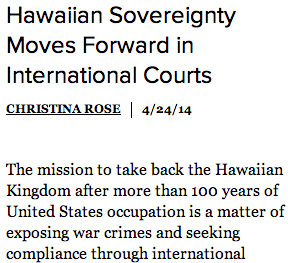 Click here to view the article.
Click here to view the article.
On the same day the Hawaiian Kingdom’s Envoy was meeting with the Swiss Federal Department of Foreign Affairs’ Directorate of International Law in Bern, Switzerland, on March 26, 2014, Dr. Keanu Sai was in a meeting with Dr. Stuart Casey-Maslen, head of research for the Geneva Academy of International Humanitarian Law in Geneva. The University of Lausanne, the International Committee of the Red Cross, the United Nations High Commissioner for Human Rights and the Swiss Federal Department for Foreign Affairs assists the Academy. The Academy is considering listing Hawai‘i as an occupied State.
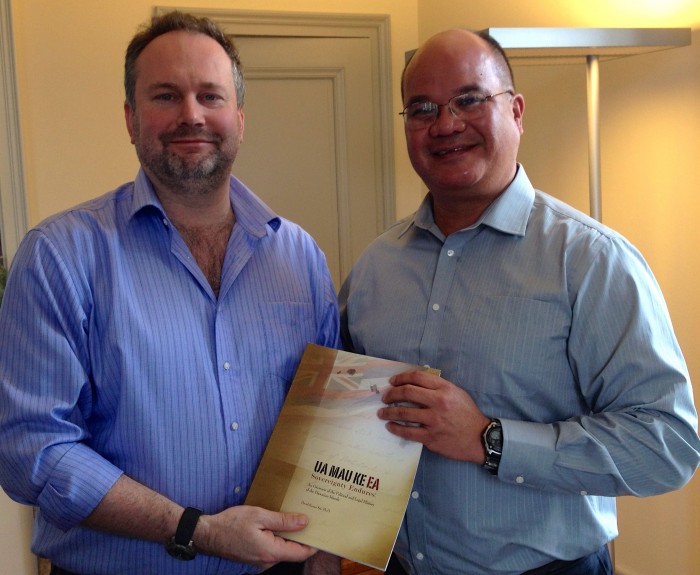 At the meeting, Dr. Sai presented a power point presentation on the history of the Hawaiian Kingdom and how it came under an illegal and prolonged occupation. Dr. Maslen was also provided with information and evidence of the occupation. Dr. Maslen assured Dr. Sai that a decision will be made and if it has been determined that Hawai‘i is occupied according to the Academy’s criteria it will be listed on its website Rule of Law of Armed Conflict in June. The website provides monthly updates on armed conflicts and occupation and is currently under construction, but will be completed by June.
At the meeting, Dr. Sai presented a power point presentation on the history of the Hawaiian Kingdom and how it came under an illegal and prolonged occupation. Dr. Maslen was also provided with information and evidence of the occupation. Dr. Maslen assured Dr. Sai that a decision will be made and if it has been determined that Hawai‘i is occupied according to the Academy’s criteria it will be listed on its website Rule of Law of Armed Conflict in June. The website provides monthly updates on armed conflicts and occupation and is currently under construction, but will be completed by June.
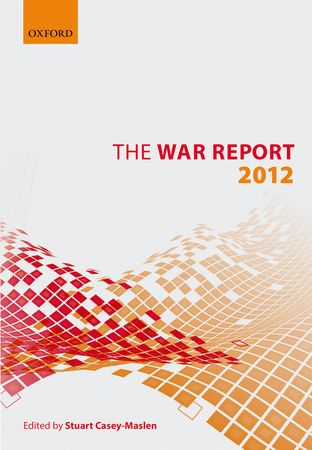 Dr. Maslen is the editor of The War Report, which is a project of the Academy that identifies and briefly discusses armed conflicts according to the criteria established under international law. The War Report is a comprehensive global analysis of armed conflicts under international law, which includes military occupations. According to the Academy, “The purpose of The War Report is to collect information in the public domain and provide legal analysis for governments, policy makers, the United Nations, academics, NGOs, and journalists.”
Dr. Maslen is the editor of The War Report, which is a project of the Academy that identifies and briefly discusses armed conflicts according to the criteria established under international law. The War Report is a comprehensive global analysis of armed conflicts under international law, which includes military occupations. According to the Academy, “The purpose of The War Report is to collect information in the public domain and provide legal analysis for governments, policy makers, the United Nations, academics, NGOs, and journalists.”
 “The classification of an armed conflict under international law is an objective legal test and not a decision left to national governments or any international body, not even the UN Security Council,” says Andrew Clapham, Director of the Academy and Graduate Institute Professor in International Law. “It is not always clear when a situation is an armed conflict, and hence when war crimes can be punished,” added Professor Clapham. “The War Report aims to change this and bring greater accountability for criminal acts perpetuated in armed conflicts.”
“The classification of an armed conflict under international law is an objective legal test and not a decision left to national governments or any international body, not even the UN Security Council,” says Andrew Clapham, Director of the Academy and Graduate Institute Professor in International Law. “It is not always clear when a situation is an armed conflict, and hence when war crimes can be punished,” added Professor Clapham. “The War Report aims to change this and bring greater accountability for criminal acts perpetuated in armed conflicts.”
The Academy’s listing of the Hawaiian Kingdom as an occupied State will promote accountability for individuals who have committed war crimes in the Hawaiian Islands where prosecution can take place before the International Criminal Court and as well as by countries that have universal jurisdiction such as the Philippines and Germany.
Due to the war crimes that continue to be committed with impunity by the State of Hawai‘i, an illegal regime, against innocent civilians, the acting government of the Hawaiian Kingdom has temporarily refrained from pursuing its proceedings at the International Court of Justice and has decided to focus its attention to secure a Protecting Power pursuant to the Fourth Geneva Convention (GCIV) and the Additional Protocol I (API). A Protecting Power is a State that ensures compliance of the Hawaiian Kingdom and the United States to the provisions of the GCIV and API, with particular focus on the protection of civilians.
As a State Party to the GCIV and AP, article 5(1) of the API, states, “It is the duty of the Parties to a conflict from the beginning of that conflict to secure the supervision and implementation of the Conventions and of this Protocol by the application of the system of Protecting Powers, including inter alia the designation and acceptance of those Powers, in accordance with the following paragraphs.” And according to article 5(3) of the API, if a Protecting Power has not been designated, “the International Committee of the Red Cross…shall offer its good offices to the Parties to the conflict with a view to the designation without delay of a Protecting Power to which the Parties to the conflict consent.”
On December 18, 2013, at its headquarters in Geneva, Switzerland, the International Committee of the Red Cross (ICRC) was formally requested to assist the Hawaiian Kingdom in securing a Protecting Power in accordance with the GCIV and API. In this pursuit, the acting government has been in the process of securing a meeting with the Swiss government in order to formally request that it be a Protecting Power and to work with the ICRC. The Swiss government has a long history of serving as a mediator to international conflicts and did serve as a protecting power in the past. A meeting was secured on March 26, 2014, and the Swiss Federal Department of Foreign Affairs’ Directorate of International Law in Bern, Switzerland, received the acting government’s Envoy Extraordinary and Minister Plenipotentiary. Negotiations to secure Switzerland as a Protecting Power for the illegal and prolonged occupation of the Hawaiian Kingdom have begun.
https://vimeo.com/17007826
On November 8, 1999, international arbitration proceedings were initiated at the Permanent Court of Arbitration (PCA), The Hague, Netherlands, between Lance Paul Larsen and the acting Government of the Hawaiian Kingdom (Larsen v. Hawaiian Kingdom). The arbitration agreement provided, “The Arbitral Tribunal is asked to determine, on the basis of the Hague Conventions IV and V of 18 October 1907, and the rules and principles of international law, whether the rights of the Claimant under international law as a Hawaiian subject are being violated, and if so, does he have any redress against the Respondent Government of the Hawaiian Kingdom?”
Larsen was arrested on October 4, 1999, in Hilo, Hawai‘i, and imprisoned for 30 days, seven of which were in solitary confinement, for following Hawaiian Kingdom law. Larsen, as the Claimant, alleged that the acting government, the Respondent, was  legally liable to him for allowing the unlawful imposition of American municipal laws over him within the territorial jurisdiction of the Hawaiian Kingdom. In the pleading, Larsen’s attorney, Ms. Ninia Parks, esq., based her case on the following grounds:
legally liable to him for allowing the unlawful imposition of American municipal laws over him within the territorial jurisdiction of the Hawaiian Kingdom. In the pleading, Larsen’s attorney, Ms. Ninia Parks, esq., based her case on the following grounds:
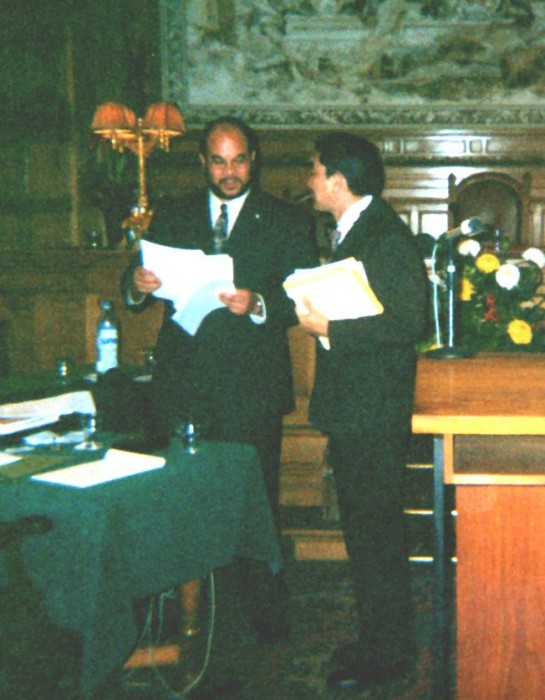 In its pleading, the acting Government, represented by Dr. Keanu Sai as lead agent, denied the allegations and submitted “that the Claimant’s rights under international law are being violated, but to what extent, is left to the Arbitral Tribunal to decide. That this decision must be made within fixed and established principles and laws pertaining to the matter, and that the Hawaiian Kingdom Government is not liable for redress of these violations under its present conditions as an occupied State.”
In its pleading, the acting Government, represented by Dr. Keanu Sai as lead agent, denied the allegations and submitted “that the Claimant’s rights under international law are being violated, but to what extent, is left to the Arbitral Tribunal to decide. That this decision must be made within fixed and established principles and laws pertaining to the matter, and that the Hawaiian Kingdom Government is not liable for redress of these violations under its present conditions as an occupied State.”
In the American Journal of International Law, vol. 95, p. 928 (2001), and reprinted in the Hawaiian Journal of Law and Politics, vol. 1, p. 83 (2004), Bederman and Hilbert, state that at “the center of the PCA proceeding was…that the Hawaiian Kingdom continues to exist and that the Hawaiian Council of Regency (representing the Hawaiian Kingdom) is legally responsible under international law for the protection of Hawaiian subjects, including the claimant. In other words, the Hawaiian Kingdom was legally obligated to protect Larsen from the United States’ ‘unlawful imposition [over him] of [its] municipal laws’ through its political subdivision, the State of Hawai‘i. As a result of this responsibility, Larsen submitted, the Hawaiian Council of Regency should be liable for any international law violations that the United States committed against him.”
 In February 2000, the PCA’s Secretary General Tjaco T. van den Hout recommended that the acting Government provide a formal invitation to the United States to join in the arbitration. In order to carry out this request by the Secretary General, Dr. Sai was sent to Washington, D.C. Ms. Ninia Parks, attorney for the Claimant Lance Larsen, accompanied Dr. Sai.
In February 2000, the PCA’s Secretary General Tjaco T. van den Hout recommended that the acting Government provide a formal invitation to the United States to join in the arbitration. In order to carry out this request by the Secretary General, Dr. Sai was sent to Washington, D.C. Ms. Ninia Parks, attorney for the Claimant Lance Larsen, accompanied Dr. Sai.
 On March 3, 2000, a telephone meeting with John R. Crook, Assistant Legal Adviser for United Nations Affairs section of the US Department of State, was held. It was stated to Mr. Crook that the “visit was to provide these documents to the Legal Department of the U.S. Department of State in order for the U.S. Government to be apprised of the arbitral proceedings already in train and that the Hawaiian Kingdom, by consent of the Claimant, extends an opportunity for the United States to join in the arbitration as a party.”
On March 3, 2000, a telephone meeting with John R. Crook, Assistant Legal Adviser for United Nations Affairs section of the US Department of State, was held. It was stated to Mr. Crook that the “visit was to provide these documents to the Legal Department of the U.S. Department of State in order for the U.S. Government to be apprised of the arbitral proceedings already in train and that the Hawaiian Kingdom, by consent of the Claimant, extends an opportunity for the United States to join in the arbitration as a party.”
Mr. Crook was made fully aware of the United States occupation of the Hawaiian Kingdom and the establishment of the acting Government. This direct challenge to US sovereignty over the Hawaiian Islands should have prompted the United States to protest the action taken by the Permanent Court of Arbitration in accepting the Hawaiian arbitration case and call upon the Secretary General to cease and desist because this action constitutes a violation of US sovereignty. The United States did  neither. Instead, Deputy Secretary General Phyllis Hamilton notified the acting Government that the United States notified the Court that it will not join in the arbitration, but did request from the acting government permission to access all pleadings and transcripts of the case. Both the acting government and Larsen’s attorney consented. By this action, the United States directly acknowledged the circumstances of the proceedings and the acting government’s representation of the Hawaiian Kingdom before an international tribunal.
neither. Instead, Deputy Secretary General Phyllis Hamilton notified the acting Government that the United States notified the Court that it will not join in the arbitration, but did request from the acting government permission to access all pleadings and transcripts of the case. Both the acting government and Larsen’s attorney consented. By this action, the United States directly acknowledged the circumstances of the proceedings and the acting government’s representation of the Hawaiian Kingdom before an international tribunal.
 Three distinguished jurists presided on the Arbitration Tribunal. Professor James Crawford, SC, served as Presiding arbitrator. Professor Crawford is a professor of international law at the University of Cambridge. At the time of the arbitration, Crawford was also a member of the United Nations International Law Commission (ILC) and was responsible for the ILC’s work on the International Criminal Court (1994) and the Articles on State Responsibility (2001).
Three distinguished jurists presided on the Arbitration Tribunal. Professor James Crawford, SC, served as Presiding arbitrator. Professor Crawford is a professor of international law at the University of Cambridge. At the time of the arbitration, Crawford was also a member of the United Nations International Law Commission (ILC) and was responsible for the ILC’s work on the International Criminal Court (1994) and the Articles on State Responsibility (2001).
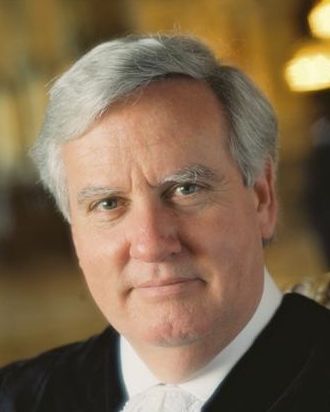 Judge Sir Christopher Greenwood, QC, served as Associate arbitrator. Greenwood was at the time professor of international law at the London School of Economics and Political Science and legal counsel to the United Nations on the Laws of War and Occupation. In 2008, the United Nations elected Greenwood to be judge on the International Court of Justice.
Judge Sir Christopher Greenwood, QC, served as Associate arbitrator. Greenwood was at the time professor of international law at the London School of Economics and Political Science and legal counsel to the United Nations on the Laws of War and Occupation. In 2008, the United Nations elected Greenwood to be judge on the International Court of Justice.
 Dr. Gavan Griffith, QC, served as Associate Arbitrator. Griffith was former Solicitor General for Australia and also served as counsel and agent for Australia in Nauru v. Australia before the International Court of Justice.
Dr. Gavan Griffith, QC, served as Associate Arbitrator. Griffith was former Solicitor General for Australia and also served as counsel and agent for Australia in Nauru v. Australia before the International Court of Justice.
Three days of oral hearings were set for December 7, 8 and 11, 2000 at the PCA. At the center of these proceedings was whether or not Larsen was able to maintain his suit against the acting Government for not protecting him without the participation of the United States who would need to answer to the alleged violations committed by them against Larsen. Larsen was attempting to hold the acting Government responsible for his injuries committed by the United States. In international law, this is a situation called the “necessary and indispensable party” rule and it was the basis of decisions made by the International Court of Justice in Monetary Gold case (Italy v. France, United Kingdom of Great Britain and Northern Ireland and United States of America), the Nauru case (Nauru v. Australia), and the East Timor case (Portugal v. Australia).
In the 2001 Arbitral Award, the Tribunal explained, that it “cannot determine whether the Respondent [the acting government] has failed to discharge its obligations towards the Claimant [Larsen] without ruling on the legality of the acts of the United States of America. Yet that is precisely what the Monetary Gold principle precludes the Tribunal from doing. As the International Court explained in the East Timor case, ‘the Court could not rule on the lawfulness of the conduct of a State when its judgment would imply an evaluation of the lawfulness of the conduct of another State which is not a party to the case.’”
The Tribunal, however, did acknowledge the Hawaiian Kingdom to be an independent State. In its decision, the Tribunal concluded in the Award, “that in the nineteenth century the Hawaiian Kingdom existed as an independent State recognized as such by the United States of America, the United Kingdom and various other States, including by exchanges of diplomatic or consular representatives and the conclusion of treaties.” International law provides for the continuity of the Hawaiian Kingdom since the nineteenth century to the present, which was the basis for the arbitration case in the first place.